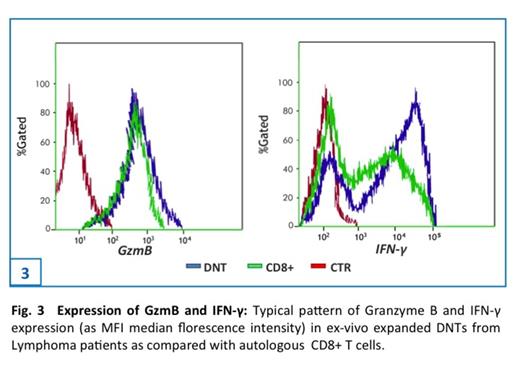
Many aspects of lymphoma pathophysiology indicate mutual interactions between the host immune system and lymphoma cells. These interactions may either promote or control lymphomagenesis. An unconventional subset of CD4-CD8- double-negative T cells (DNTs) has been recently described to contribute specifically to anti-tumor immunity. Indeed, DNTs are involved in immune regulation and tolerance as well as in host defense and inflammation, acting as regulatory T cells and/or cytotoxic T cells. DNTs are T lymphocytes which express either αβ or γδ T-cell receptors (TCR) and lack CD4, CD8 and CD56. In healthy human donors and murine models, they constitute about 1-5% of the lymphocytes in peripheral blood and in lymphoid organs. No data are available on the role of DNT cells in human anti-lymphoma immunity. Information from murine models suggests that expanded DNT cells would not impair host immunity against lymphoma and would perhaps stimulate it. DNT cells have also demonstrated to have a direct in vitro anti-tumor activity against lymphoma. Few data are available on the prognostic significance of DNTs in lymphomas, on their interaction with other immune cells, and on their functional attitude.
The aim of this study was to assess the frequency and the functional attitude of circulating DNTs in Lymphoma patients and healthy donors as controls, in order to assess the role of DNTs on clinical outcome and progression.
To test this population as prognostic factor on clinical outcome and progression of lymphoma disease, peripheral blood (PB) and bone marrow (BM) samples of 46 Lymphoma patients (pts), with non-Hodgkin's Lymphomas and classical Hodgkin Lymphoma were selected and prospectively collected at diagnosis and after one month till the end of chemo- or immuno-chemotherapy therapy. Blood samples were collected also at the time of relapse or progression. As control PB samples of 16 healthy donors were collected. Circulating DNT subsets (TCRαβ+ and TCRγδ+) were characterized for their ontogeny, tolerogenic or cytotoxic attitude and TCR clonality by staining with the following conjugated monoclonal antibodies (MoAbs) for surface and intracellular markers: CD3, CD4, CD8, CD56, CD45, TCRαβ, CD45Ra, CD45Ro, CCR7, CD27, CD28, CD30, CD69, GITR, CD95, CD178, CD152, IFN-γ, TNF-α, granzyme B, and perforin. Isotype-matched MoAbs were used as staining controls. For functional studies, DNTs were purified from PBMCs of patients through a negative selection by using specific MACS microbeads and then cultured for 2 weeks in complete medium supplemented with anti-CD3 (OKT3), rhIL-2 and rhIL-4. Data were acquired using an 8-colour flow cytometer and analyzed using Kaluza software. Data were compared among the groups using the Mann-Whitney non-parametric test or Kruskal–Wallis one-way analysis of variance. The study was approved by the local Ethics Committee and all patients provided their informed consent in accordance with the Declaration of Helsinki.
The percentage (mean + SE) of DNTs in BM (2.367 ± 0.5891) of Lymphoma pts was lower than in PB samples (3.421 ± 0.981). Moreover we observed a significant decrease (p = 0.006) of circulating αβ-DNTs in pts with untreated lymphoma (23.7 ± 3.7) as compared with healthy controls (31.3 ± 3.4), and their number seemed to be modulated by disease relapse/progression or disease treatment. (fig.1). In Hodgkin's Lymphoma circulating αβ-DNTs were significantly increased as compared with other histotypes (p = 0.0001) (fig.2). Circulating αβ-DNTs were significantly decreased (p=0.006) in serial samples collected after treatment or at the time of disease relapse. Interestingly, after ex vivo expansion, DNTs acquired an immunomodulatory cytokine profile, characterized by the secretion of IFN-γ and granzyme B which are known as central components of anti-tumor immune responses (fig.3).
To date, no data have been reported on DNT phenotypic and functional characterization in Lymphoma patients. Our study has demonstrated for the first time that αβ-DNTs could play an important role in both the development and the progression of lymphomas. In addition, based on our preliminary results, it is likely that ex-vivo expanded DNTs exert an anti-tumor activity thus suggesting their possible use as a new strategy for adoptive immune-therapy.
No relevant conflicts of interest to declare.
Author notes

This icon denotes a clinically relevant abstract




This feature is available to Subscribers Only
Sign In or Create an Account Close Modal